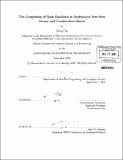The complexity of Nash equilibria in multiplayer zero-sum games and coordination games
Author(s)
Cai, Yang, Ph. D. Massachusetts Institute of Technology
DownloadFull printable version (2.546Mb)
Other Contributors
Massachusetts Institute of Technology. Dept. of Electrical Engineering and Computer Science.
Advisor
Constantinos Daskalakis.
Terms of use
Metadata
Show full item recordAbstract
We prove a generalization of von Neumann's minmax theorem to the class of separable multiplayer zero-sum games, introduced in [Bregman and Fokin 1998]. These games are polymatrix-that is, graphical games in which every edge is a two-player game between its endpoints-in which every outcome has zero total sum of players' payoffs. Our generalization of the minmax theorem implies convexity of equilibria, polynomial-time tractability, and convergence of no-regret learning algorithms to Nash equilibria. Given that three player zero-sum games are already PPAD-complete, this class of games, i.e. with pairwise separable utility functions, defines essentially the broadest class of multi-player constants sum games to which we can hope to push tractability results. Our result is obtained by establishing a certain game-class collapse, showing that separable constant-sum games are payoff equivalent to pairwise constant-sum polymatrix games-polymatrix games in which all edges are constant-sum games, and invoking a recent result of [Daskalakis, Papadimitriou 2009] for these games. We also explore generalizations to classes of non- constant-sum multi-player games. A natural candidate is polymatrix games with strictly competitive games on their edges. In the two player setting, such games are minmax solvable and recent work has shown that they are merely affine transformations of zero-sum games [Adler, Daskalakis, Papadimitriou 2009]. Surprisingly we show that a polymatrix game comprising of strictly competitive games on its edges is PPAD-complete to solve, proving a striking difference in the complexity of networks of zero-sum and strictly competitive games. Finally, we look at the role of coordination in networked interactions, studying the complexity of polymatrix games with a mixture of coordination and zero-sum games. We show that finding a pure Nash equilibrium in coordination-only polymatrix games is PLS-complete; hence, computing a mixed Nash equilibrium is in PLS n PPAD, but it remains open whether the problem is in P. If, on the other hand, coordination and zero-sum games are combined, we show that the problem becomes PPAD-complete, establishing that coordination and zero-sum games achieve the full generality of PPAD. This work is done in collaboration with Costis Daskalakis.
Description
Thesis (S.M.)--Massachusetts Institute of Technology, Dept. of Electrical Engineering and Computer Science, 2010. Cataloged from PDF version of thesis. Includes bibliographical references (p. 47-48).
Date issued
2010Department
Massachusetts Institute of Technology. Department of Electrical Engineering and Computer SciencePublisher
Massachusetts Institute of Technology
Keywords
Electrical Engineering and Computer Science.